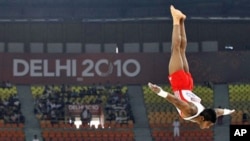Host India opened the Commonwealth Games in New Delhi Sunday despite the near public relations disaster the event has become for the government. Just days before the Games were to start, a stream of complaints erupted about accommodations for athletes, flooding, security and health concerns. Amid the chaos, a pedestrian bridge also collapsed at the main stadium.
VOA spoke to John Barton, a journalist and sports director of the Asia-Pacific Broadcasting Union. Barton is covering the games in New Delhi.
What are some of the problems you have witnessed at the Games?
This is the worst games that I've ever been involved in terms of organization. Now, that's very critical of the organizing committee of the Delhi Commonwealth Games, and the way in which they've approached this. The decision some years ago to appoint, basically, government officials, and friends of government officials, to run the games was a major mistake. We do not see here in Delhi the wonderful dynamism of the young entrepreneurs and the young Indians who are driving the local economy. What we are seeing is a lumbering bureaucracy which has almost dragged the event down to the bottom line where there were days that we feared that we might not get a broadcast to air. In fact, at some hours the broadcasts hung by a thread. And so, very, very hard, very tough, and simply due to very poor organization."
There have been many reports about problems with the accommodations. What are they like?
The accommodations at the athlete's village, they have finished up fixing those, even though in a lot of the tower blocks, they were flooded by heavy rains, which then brought mosquitoes, flushed out snakes like cobras and stuff like that, so this was before the athletes arrived. But the athletes will tell you now that the accommodation is fine, that all those issues have been solved. One of the biggest problems that we face, we've got 1,600 people working on the host broadcast, and at the venues, no food has been provided. We have 2,000 broadcasters in the International Broadcast Center, and there's no food, and there hasn't been any food since we arrived two weeks ago. So that gives you an idea of the critical lack of organization, when you've got nearly 4,000 people working 12, 15, 18 hour days who can't be fed at a venue? And can't be fed at the International Broadcast Center, and that is an absolute shame. So, you can't tell me, and they can't tell me that these games are anything short of a disaster in that sense.
What about the spectators? Is it true that some of the events have not been very well attended?
Well that's true. That goes down again to the marketing drive by the organizing committee. It goes down to their sales and promotion activities. It was very, very sad this morning [Monday] when we were on air when we were at the netball venue, Australia was playing in the first game. Australia scored 76 points in their first match and there were only 58 spectators in the venue. Now, the reasons for that, you best ask the organizing committee but, obviously, that again illustrates the sort of problems we've been having at that level. Having said all that, the one I suppose salvation in all of this is that broadcasters have gone about their job very professionally, very efficiently and we are getting pictures out. We are getting our sound and pictures out to the very highest standard. So, India should be delighted with what we're doing.




